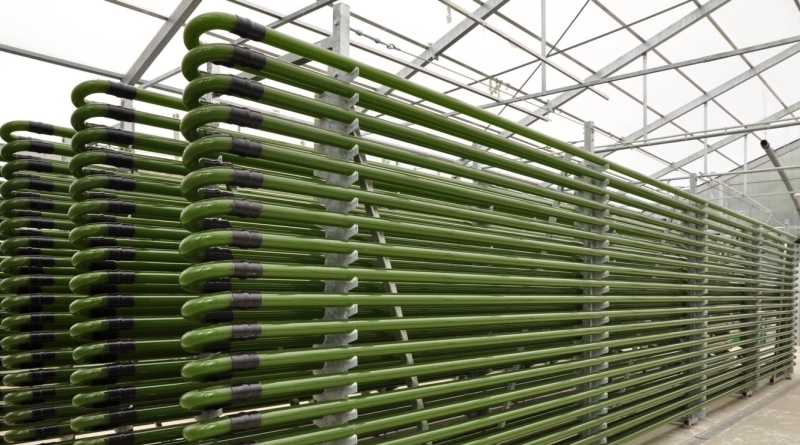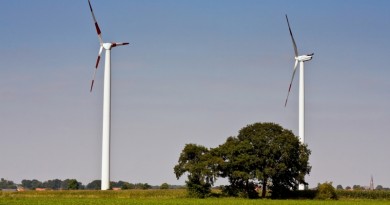Biofuel production from algae
Contents
The world’s dependence on the non-renewable energy sources (fossil fuels) is thorn in the eyes of many environmentalists and scientists across the globe. It is really no surprise why there is global effort to cut down the dependence on fossil fuels and develop an economically viable and scalable alternative fuel source that will significantly reduce massive emissions of CO2 in the atmosphere. Among mostly talked about alternative sources are biofuels. Biofuels are quite adequate to provide an alternative to fossil fuels and can also reduce total CO2 emissions because generally speaking biofuels are more ecologically acceptable energy source compared to fossil fuels. Fewer CO2 emissions from biofuels are result of closed carbon circle – plants and algae use CO2 to grow, and when biofuel is used this CO2 gets back into atmosphere. Fossil fuel carbon footprint is one way only – from ground info atmosphere.
Biofuels can be solid, liquid, or even gaseous fuels that have its origin in recently deceased biological material. For photosynthetic organisms, for instance corn or soybeans, the plants use the energy of sunlight to convert available CO2 into hydrocarbons, storing chemical energy. This is really a double benefit because not only fuel is produced but also CO2 is consumed which has positive effect on both energy demand, as well as tackling the climate change. Biofuels can be produced from any biological carbon source, currently mainly variety of crops are used for biofuel production, both in the United States as well as in Europe and other parts of the world. There is a small division between crops as corn with sugars is typically used for ethanol production while soy, canola, and palm with oils are typically used for biodiesel production.
There are also some disadvantages too, as growing these crops typically requires good quality agricultural land, which increases the overall demand for cropland, not to mention that we are basically speaking about transforming food into the fuel which does not seem to be quite acceptable when there are more than one billion hungry people in the world. So using food for fuel production definitely is not a logical choice, regardless of biofuel potential.
ADVANTAGES OF USING ALGAE FOR BIOFUEL PRODUCTION

Algae have many reasons why they could be consider as one of the most perfect choices for biofuel production. Algae grows 50 to 100 times faster than conventional food crops, and according to some energy experts biofuels produced from algae have the potential to become one of the best alternative energy solution that could one day even be capable enough to replace currently dominant fossil fuels. Additional advantage is that algae are single-cell organisms meaning they do not require freshwater resources or soil for growth, which makes things lot easier.
Where can algae grow? Algae can grow in aqueous suspension in many non potable and saline water sources (non potable water is water of a quality not suitable for drinking or cooking). By growing algae in areas that are not suitable for food crop production, more land and water can be made available for growing food, and more food can be produced to fight world hunger instead ending up as the fuel. If we go 30 years back, or to be more precise in 1978, we can see that even then the U.S. Department of Energy (DOE) launched the Aquatic Species Program to research the production of energy and biodiesel from algae. So this is not new idea as many people think it is. However this research was not very productive mainly because crude oil prices continued to decline in the mid-1990s and the fact that DOE was forced to cut costs, which resulted in shutting down the program in 1996.
However, study still comes up with some significant results and the most important conclusion was definitely that algae could achieve the desired production yields. There was also one major setback in this research, namely that researchers concluded that the solution could not be cost-effective unless the price of oil doubled. This conclusion has its solid ground all the way until 2006 when oil prices nearly tripled to what they were the previous decade, and continue to rise even further. There is also the ever-present climate change problem and the tendency to reduce greenhouse gas emissions on global level, so basically we are currently at the right time for a fresh look at algae as a potential energy source.
ALGAL GROWTH SYSTEM TECHNOLOGY
Biofuel production from algae is very interesting topic of research to many scientists across the globe, and one of the leading research centres is definitely The Engines and Energy Conversion Laboratory (EECL) at Colorado State University that focuses on developing technological and industrial solutions for serious energy and environmental challenges. Their main focus on biofuel production from algae was to deliver scalable, cost-effective technology to produce biofuels from algae. One of the main players in this sector is definitely Solix Biofuels, a company that has refined multiple generations of the Algal Growth System (AGS) technology now operating at the Coyote Gulch Demonstration Facility in south-western Colorado.
Solix Biofuels Inc. is the leader in the production of technologies used to create energy from algae. Their technology aims to enable the large-scale commercialization of micro algae based fuels and co-products. Algae can be cultivated in two ways – in an open pond system (either naturally occurring or engineered) or in an engineered closed system. Algae must be hardy and resistant to competitors when grown in open pond systems because we are talking here about the environmental conditions that cannot be easily controlled.
Without controlled conditions, it can be difficult to sustain desired species of algae or grow them at optimal rates for biomass or fuel production. This is the reason why Solix Biofuels mainly develops closed growth systems. Closed growth systems have several advantages; not only do they support the cultivation of specific target cultures but also a closed growth system can feed CO2 from industrial processes directly to the algae at high concentrations, which maximizes the amount of captured CO2. The first closed-system prototype of AGS was made in 2006. Since that period Solix Biofuels has continued to refine its technology and significantly expand its area under algae cultivation. Their latest success happened in July 2009, when they commissioned a large-scale growth system for the production of biofuels at our Coyote Gulch Demonstration Facility.
What exactly did they achieve?
They started with one big challenge, namely to develop data acquisition and controls to manage and control the growth process for its AGS automation system. They wanted a single technology platform that would support both natural and industrial operation. In natural conditions the platform needed to be flexible so variety of chemical and physical sensors and flow actuators had to be used. For plant operations in an industrial environment, the main emphasis is on stable, reliable and straightforward platform that has to interface with industrial-scale instrumentation and controls. Industrial environment also needs all data to be collected in a central repository and presented in a variety of formats that are accessible and useful to all stakeholders, including managers, operators and R&D personnel. Therefore they created the entire Supervisory Control and Data Acquisition (SCADA) system for their AGS, including the operator user interface and data logging and Compact FieldPoint code that monitors and controls the algal growth process.
Their pilot plant includes a variety of systems built for delivering gas and liquid flows to the AGS, growing the algae, harvesting the algae, and processing the harvested algae into biofuel products. They are now able to collect data from both small- and large-scale process tests and profile the response of different types of algae to varying atmospheric variations. In addition to controlling the algae-based biofuel production process, they are also able to log a range of measurements during each test, providing researchers and control engineers with valuable data.
CONCLUSION
Algae-based biofuel definitely has the potential to revolutionize the energy industry and play a leading role in fight against greenhouse gas emissions, and climate change. Of course in order to do so, a lot more researches will be needed, and companies like Solix Biofuels are pioneers that can turn this sector into one of the most competitive on energy market. Fossil fuels lobbies are still too strong but as the climate change problem is gaining strength it looks like they could soon lose some of its influence, and this could open the door to biofuel production. Biofuels production from algae definitely deserves more attention in years to come. Its potential, the fact that we do not transform food into fuel like with corn or soy, and there is also lot fewer emissions involved when compared to fossil fuels. This should be more than enough to ensure more funds for future research of this very interesting energy source.
Energy demand will not decrease in years to come, it will only become bigger, and we will definitely need more fuel, regardless of how dominant fossil fuels will be in the future. Biofuel production from algae could be one of the surprising competitors on alternative energy market in not so long future, especially if oil prices continue to grow. And in the meantime companies like Solix Biofuels should continue their research pointing out advantages of this process so when the time is right there would not be a big problem implementing biofuel production from algae into competitive energy sources on global energy market.



